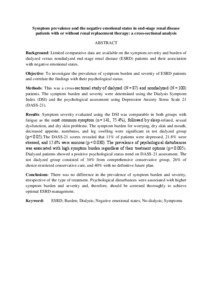Citation
Zukiman, Wan Zul Haikal Wan and Yaakup, Hayati and Zakaria, Nor Fadhlina and Shah, Shamsul Azhar
(2017)
Symptom prevalence and the negative emotional states in end-stage renal disease patients with or without renal replacement therapy: a cross-sectional analysis.
Journal of Palliative Medicine, 20 (10).
1127 - 1134.
ISSN 1096-6218, ESSN: 1557-7740
Abstract
Background: Limited comparative data are available on the symptom severity and burden of dialyzed versus nondialyzed end-stage renal disease (ESRD) patients and their association with negative emotional states.
Objective: To investigate the prevalence of symptom burden and severity of ESRD patients and correlate the findings with their psychological status.
Methods: This was a cross-sectional study of dialyzed (N = 87) and nondialyzed (N = 100) patients. The symptom burden and severity were determined using the Dialysis Symptom Index (DSI) and the psychological assessment using Depression Anxiety Stress Scale 21 (DASS-21).
Results: Symptom severity evaluated using the DSI was comparable in both groups with fatigue as the most common symptom (n = 141, 75.4%), followed by sleep-related, sexual dysfunction, and dry skin problems. The symptom burden for worrying, dry skin and mouth, decreased appetite, numbness, and leg swelling were significant in not dialyzed group (p < 0.05).The DASS-21 scores revealed that 11% of patients were depressed, 21.8% were stressed, and 15.6% were anxious (p < 0.030). The prevalence of psychological disturbances was associated with high symptom burden regardless of their treatment options (p < 0.005). Dialyzed patients showed a positive psychological status trend on DASS-21 assessment. The not dialyzed group consisted of 34% from comprehensive conservative group, 26% of choice-restricted conservative care, and 40% with no definitive future plan.
Conclusions: There was no difference in the prevalence of symptom burden and severity, irrespective of the type of treatment. Psychological disturbances were associated with higher symptom burden and severity and, therefore, should be screened thoroughly to achieve optimal ESRD management.
Download File
![[img]](http://psasir.upm.edu.my/63348/1.hassmallThumbnailVersion/Symptom%20prevalence%20and%20the%20negative%20emotional%20states%20in%20end-stage%20renal%20disease%20patients%20with%20or%20without%20renal%20replacement%20therapy.pdf)  Preview |
|
Text (Abstract)
Symptom prevalence and the negative emotional states in end-stage renal disease patients with or without renal replacement therapy.pdf
Download (106kB)
| Preview
|
|
Additional Metadata
Actions (login required)
 |
View Item |

